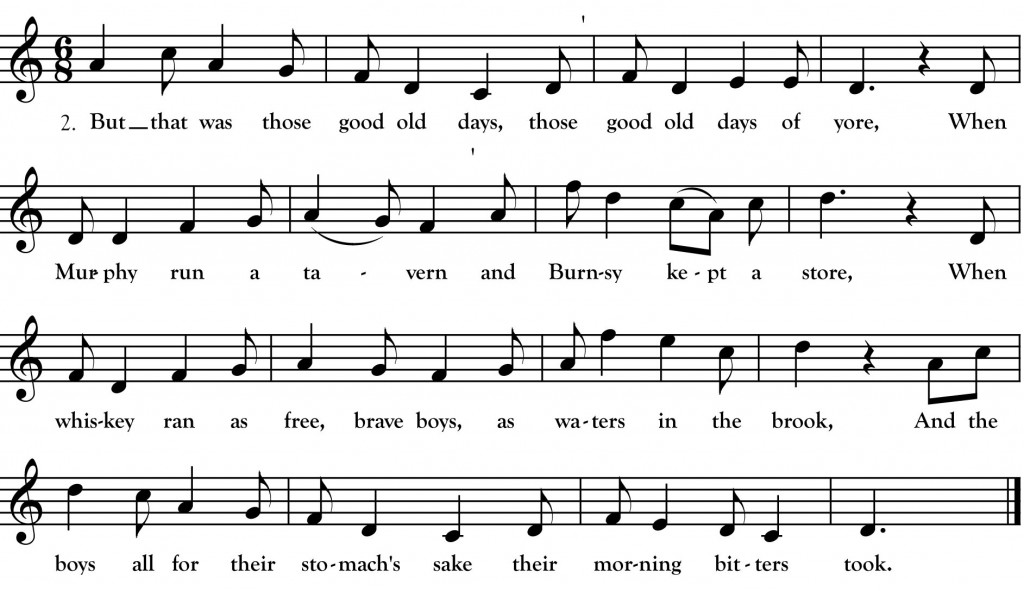Lost Jimmie Whalen

Slowly and sadly I strayed by the river,
A-watching the sunbeams as evening drew nigh,
All alone as I rambled I spied a fair damsel,
She was weeping and wailing with many a sigh.
Sighing for one who is now lying lonely,
Mourning for one who no mortal can save,
As the dark foaming waters flow sadly around her,
As onward they roll o’er young Jimmie’s grave.
“Jimmie,” said she, “won’t you come to my arms,
And give me sweet kisses as oft times you gave?
You promised you’d meet me this evening my darling,
O come dearest Jimmie, love, come from the grave!”
Slowly there rose from the depths of the river,
A vision of beauty far fairer than sun,
While red robes of crimson encircled around him,
Unto this fair maiden to speak he’s begun.
“Why did you rise me from the realms of glory,
Back to this place where I once had to leave?
To clasp you once more in my fond loving arms?
To see you once more I have come from my grave.”
“Jimmie” said she, “why not stay on earth with me,
Don’t leave me here for to weep and to rave,
But if you won’t mind me and bide here beside me,
Oh Jimmy take me to your cold silent grave.”
“Darling to me you are asking a favor
That no earthy mortal can grant unto thee.
For death is the dagger that holds us asunder,
And wide is the gulf, love, between you and me.”
“One fond embrace, love, and then I must leave you
One loving kiss, pet, and then we must part.”
And cold were the arms he encircled around her,
While cold was the bosom she pressed to her heart.
Then straightway the vision did vanish before her,
Straightway to the sky he then seemed to go,
Leaving his loved one distracted and lonely,
Weeping and wailing in sadness and woe.
Throwing herself on the banks of the river,
Weeping and wailing her poor heart would break,
Sighing “My loved one, my lost Jimmie Whalen,
I will lie down and die by the side of your grave.”
Norah Rendell and I have been singing this beautiful song for several years but somehow it has never made it onto Northwoods Songs!
It is one of two songs that commemorate the tragic drowning of a raftsman named James Phalen around 1878 in Ontario. Collector Franz Rickaby, who prints both songs in his book Ballads and Songs of the Shanty-Boy, corresponded with multiple informants who knew the details of the Phalen drowning. It happened at King’s Chute on Ontario’s Mississippi River–a tributary of the Ottawa where the rafting crew was working for a boss named Peter McLaren who went on to be a senator. Phalen and two others were attempting to break a log jam at the “Upper Falls” section of the Chute. Phalen fell in and was swept under the logs.
Rickaby’s informants told him that the other popular “Whalen” song, “Jim Whalen,” was definitely based on the Phalen tragedy (apparently the name was pronounced “Whalen” in that part of Ontario). They said it was written and sung “with much pathos” by a local songsmith in Lanark, Ontario named John Smith.
Rickaby was not certain that the ghost-visiting narrative of “Lost Jimmie Whalen” referred to the same drowning victim as the more journalistic “Jim Whalen.” Rickaby collected only a three verse fragment “Lost Jimmie Whalen” from Will Daugherty of Charlevoix, Michigan in 1919. A version collected in the 1950s in Ontario from Martin Sullivan by Edith Fowke clearly makes the Phalen connection by including an additional verse:
“Hard, hard were the struggles on the cruel Mississippi,
But encircled around her on every side,
Thinking of you as we conquered them bravely,
I was hoping some day for to make you my bride.”
The above-transcribed melody comes from yet another Great Lakes region singer named Robert Walker who lived in Crandon, Wisconsin (Walker’s version appears on this wonderful Folkways album). Walker’s melody, a relative of the one frequently used for “Lass of Glenshee,” is similar to that used by Sullivan but I prefer the way Walker sings the opening bar. The text above is primarily from Walker with a few lines borrowed from the Daugherty and Sullivan versions and a couple changed of my own in the sixth stanza.


